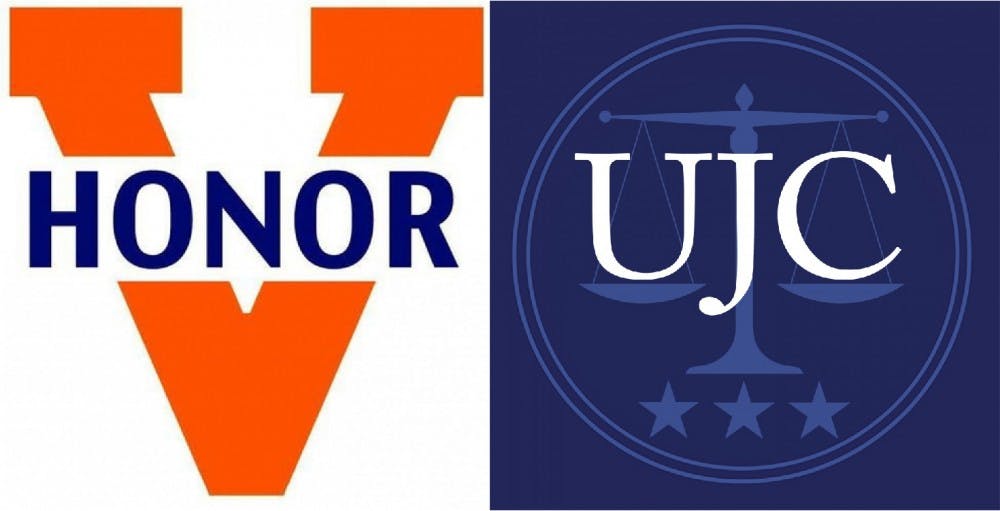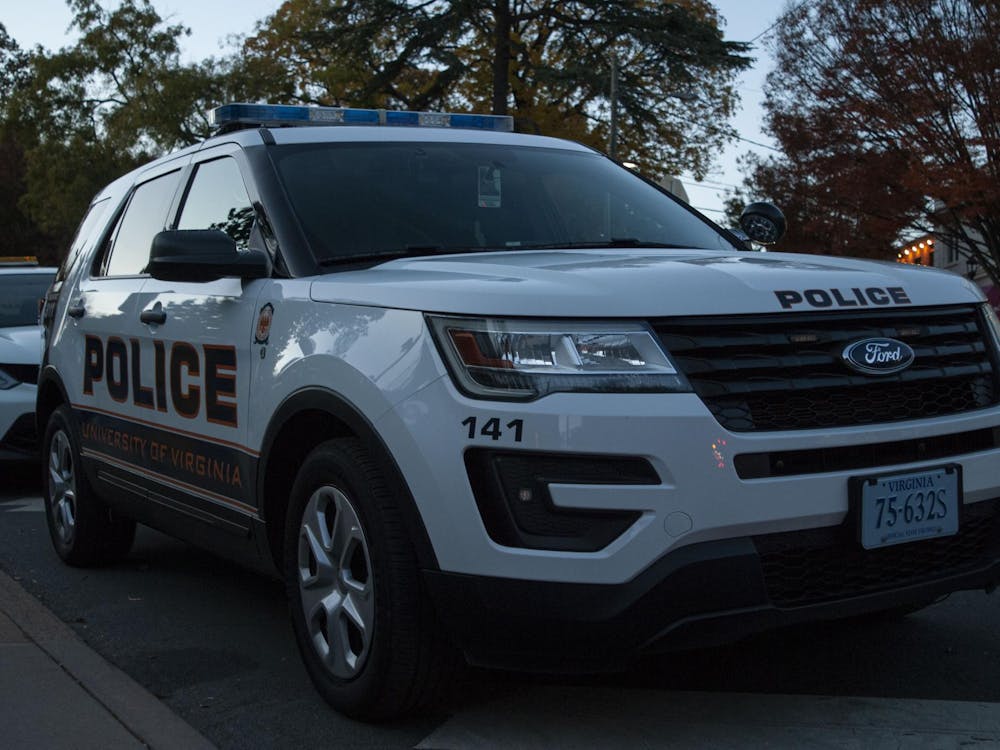The University Judiciary Committee and the Honor Committee representatives voted for incoming chairs in internal elections held in late March — electing third-year College student Shannon Cason to UJC Chair and third-year College student Lillie Lyon to Honor Chair. Before officially beginning their terms April 1, Cason and Lyon — who respectively succeeded fourth-year Engineering student Kevin Warshaw and fourth-year Medical student Ory Streeter — spoke to the developing outreach roles within their committees and how education may be approached under their administration.
The UJC adjudicates cases regarding violations of the University’s 12 Standards of Conduct, which are outlined by the committee and uphold standards for student self-governance adopted by the Board of Visitors. In sanctioning cases of misconduct, the UJC operates on a multi-sanction system in which students may be assigned sanctions that range from essays or community service to suspension or expulsion.
Honor holds jurisdiction over what the committee defines as “a Significant Act of Lying, Cheating or Stealing, which Act is committed with Knowledge.” The Honor committee sanctions these violations with what has evolved from a single-sanction system, in which expulsion was the sole outcome, to include the informed retraction that allows students who take responsibility and make amends for their Honor violation to leave the University for two semesters.
In both Honor and UJC, support pools work alongside the elected representatives who sit as judges in trials and oversee administrative maintenance of the committees. UJC consists of twenty-five representatives — with three from the College and two from each remaining school — along with 12 appointed First Year Judiciary Committee representatives. Honor is comprised of 27 representatives — with five from the College and two from the ten remaining schools.
Selection and composition
Each committee appoints its support pools through an application process. Honor accepted 54 of 109 applicants — about a 34 percent acceptance rate — to become support officers in fall of 2018. UJC accepted nine new investigators but did not provide total applicant numbers and brought in 14 new counselors out of 63 total applicants — about a 22 percent acceptance rate. Cason said all but one of those who applied to the educator pool were accepted this year.
This past fall, UJC reformed the application process for FYJC, counselors and investigators to an essay-based application rather than through multiple choice and short answer questions, but the application to become an educator is completed through a Google form. All applicants must interview for their position. Honor support officers are similarly selected based on an application process consisting of an applicant questionnaire and two rounds of interviews.
The UJC educator pool is a body currently consisting of 19 members who focus specifically on communicating with the greater University community, with two additional support staff pools of 19 investigators and 26 counselors. Investigators and counselors are directly involved with trial processing — investigators compile evidence from sources to create an unbiased account of the event in question, and counselors advise parties throughout the trial and serve as oral advocates for clients.
As a former senior educator, Cason restructured the educator pool to facilitate more direct contact and connections with other student groups. The restructuring was particularly focused on outreach to underrepresented groups. Outreach is also done through co-sponsorships, in which the committee provides funding and support for another organization’s event.
There are 105 support officers for Honor, who are also responsible for this educational aspect, but take on these duties in addition to investigating, counseling and advising roles. Lyon said that the incoming administration is rethinking this structure and intends to create more specialized roles within the support officer pool, which she said would allow training to be more individualized toward each responsibility.
“We have a lot of really good generalists, but we don’t have as many people who can serve in one role very specifically very, very well,” Lyon said in regards to the current system. “And so the idea is to create more people like that.”
A changing system
Cason and Lyon both said that their committees’ organization of support officer pools are the result of change over time. Prior to her time on the committee, Cason noted that UJC educators were more involved with specific trial and case-work. Previously, UJC educator responsibilities included recording trials and collecting feedback from accused students after the process. Cason said the current system, in which educators do not have trial centric roles, comes with a new set of challenges. In its 2017-18 term, UJC heard 73 cases.
“It gave us more time to focus on some of the outreach and cosponsorship stuff, but I think it does make educators a little more separate from UJC, from sort of the trial process, and not necessarily in the best way,” Cason said. “So I’m trying to figure out, going forward for next year, how to incorporate them more.”
Lyon said that Honor’s consolidated support officer pool — a pool that is able to participate in trials, unlike UJC educators — was a change made in 2013 that progressed from a system that once separated educators, investigators and advisors into specialized entities. Although Lyon noted that firsthand trial experience does bolster the educator’s role, she said it would also be beneficial for educators to have an outsider’s perspective.
“As far as just education in general, I think there are two facets,” Lyon said. “So you both have that presentation role and answering questions and being able to speak in depth to your experiences, but then also there’s just kind of the brainstorming and the creation of initiatives and the planning of all that.”
A dual perspective: How visibility, outreach differ between the systems
First-year College student Lauren Kim has experience in both organizations by serving as both an Honor support officer and a member of the FYJC, and she has been appointed as incoming senior data manager for UJC. Kim said that for Honor support officers, having such an involved familiarity with Honor’s infrastructure is not necessary when addressing audiences as an educator.
“When you’re sitting there presenting to a [Contracted Independent Organization] or a dorm association, they don’t want to hear about the little nitty gritty parts of trial processing,” Kim said during an interview with The Cavalier Daily. “They just want to know how it involves them.”
Kim’s role in FYJC is focused on adjudicating cases and, conversely, does not interact with the educational role of UJC. Cason said that most FYJC members transition into educator, investigator or counselor roles after their first-year but noted that stepping into the executive position of senior data manager, as Kim is doing for the new term, is an exception to the trend.
It was acknowledged by all that Honor’s larger budget — which is due to the committee’s ability to draw from an alumni-funded endowment currently valued at around $3.3 million — gives Honor an advantage over UJC in their capacity for outreach and visibility around Grounds. UJC also recently established an endowment, but the committee is waiting to put it to use, as it is relatively new and thus only has a current value of $13,000. Cason said that one of the main reasons students often confuse UJC with Honor or fail to understand the system altogether is because of a lack of visibility related to these budget disparities.
“I think one misconception that we have is that we’re sort of a branch under Honor and not sort of an equal companion to that,” Cason said. “That’s again because of people not knowing about us — one because we don’t have any money and also because we need to reach out more and things like that.”
With a larger budget, the Honor committee is less restrictive when delegating funds, with Lyon saying that Honor is able to co-sponsor with most CIOs who apply for funding. Kim said that as a member of both committees, she’s noticed how the size of each organization’s budget has impacted the disparity in outreach and visibility between the two.
“Because [UJC has] a smaller budget, we’re not allowed to co-sponsor with a lot of different people and with a lot of organizations here,” Kim said. “As compared to Honor, which has a huge budget, and everyone knows who Honor is, and we always have our name out there.”
However, Kim added that UJC has made an effort to form connections through co-sponsorships, including recent support of First Year Council multicultural events. Cason also said that although UJC does not have as much flexibility in its budget, the committee does aim to participate in collaboration with other student organizations — but must do so with more discretion than Honor.
“When we do do our co-sponsorships and stuff, we have to be very purposeful in wherever we’re going to spend our money,” Cason said. “So a lot of the time the things that we will do are going to be ones that have more visibility, and there’s more student access.”







